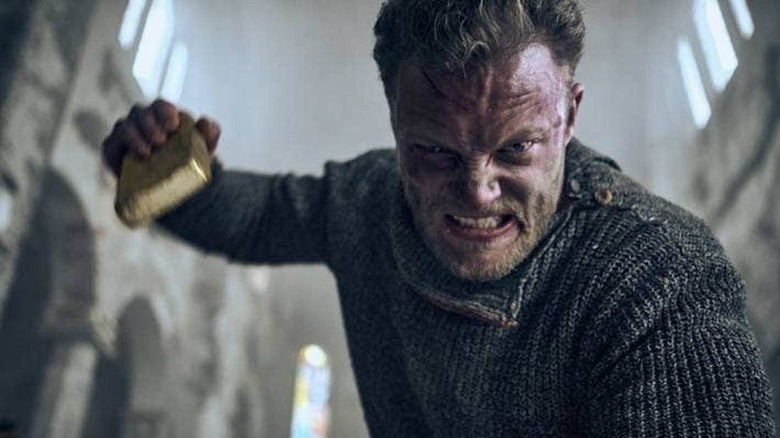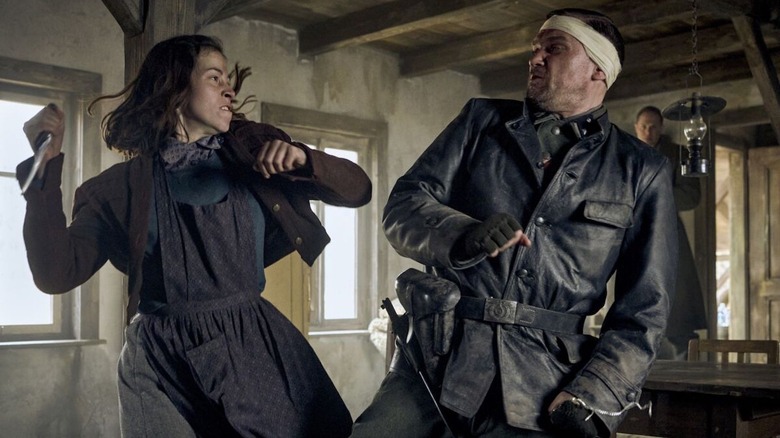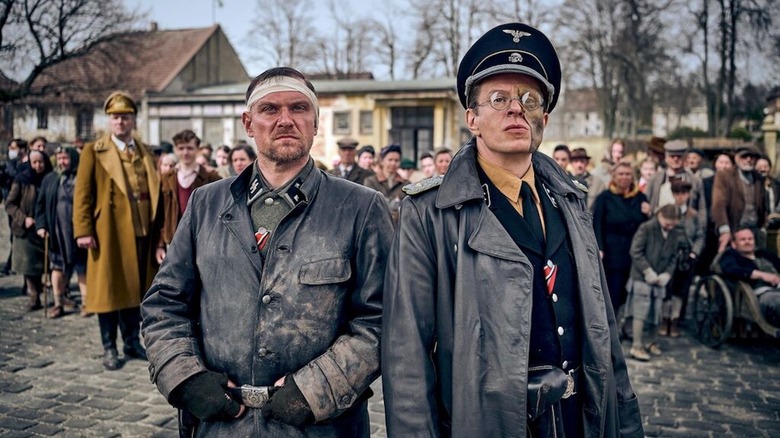Blood & Gold Blasts Treasure-Hungry Nazis And Has A Good Time Doing It
If you go into Peter Thorwarth's "Blood & Gold" completely cold (which you should), the pre-credits sequence feels like it's prepping you for a cold-hearted piece of Nazisploitation. The movie opens with a deserting German soldier running from a Waffen-SS company led by a sadistic lieutenant colonel and his even more vicious second-in-command. As the AWOL private scampers across a wide-open field, we know there is no chance for escape. And while the SS officers are enjoying the fox-hunt nature of the chase, what they really want is to subject their prey to an excruciating death.
If you're familiar with this subgenre (the apogee/nadir being the "Ilsa: She-Wolf of the SS" quadrilogy), what happens next promises to be an endurance test of human cruelty. And you believe this is possible because, as the deserter, Robert Maaser comes off as a dead-eyed charisma vacuum. He's not a character; he's torture fodder.
The SS monsters spare him in a sense. They leave him to hang. Slowly, yes, but compared to what the Nazis did in real life, let alone exploitation movies, this counts as mercy. As Maaser's private gasps for his last remaining breaths, he sees a vision of his wife and two children. His wife and son depart, leaving him with his daughter. The inference is clear: she is still alive, and he cannot bear to leave her to a country overrun by savages. Suddenly, he is cut down from the tree by a mysterious woman.
"Blood & Gold" isn't Nazisploitation, thank god, but what exactly is it?
A tale of revenge, plunder, and survival
An action caper infused with the righteous, revisionist violence of Quentin Tarantino's "Inglourious Basterds," Peter Thorwarth's "Blood & Gold," currently streaming on Netflix, delights in keeping experienced viewers on their toes. As Maaser's private, Heinrich, hides out in the home of farmer Elsa (Marie Hacke), who looks after her mentally disabled brother Paule (Simon Rupp), the SS sets up shop in a nearby village where a since-exiled Jewish family allegedly left behind a stockpile of gold. As Lt. Col. von Starnfeld (Alexander Scheer) and his attack-dog sergeant (Roy McCrery) attempt to ascertain the whereabouts of the loot, Heinrich regains his strength so that he may return home to his young daughter.
Thorwarth's previous film, "Blood Red Sky," mashed up a hijacking thriller with a vampire flick, which sounds like a blast, but the execution was a tad lacking. He's on far more secure footing with "Blood & Gold," if only because he doesn't blow his load on one WTF twist. He spins his tires a bit in the first act as he delays the impetus for Heinrich and Elsa to go to the village, but once they get there he subverts our narrative expectations in fiendishly clever ways. For a moment, it looks like we might be subjected to a series of fistfights between Heinrich and the sergeant until the finale, but Thorwarth puts that out of play with a third-act surprise that sets up an immensely satisfying showdown in the town's ancient church.
A pulpy prelude to greatness?
"Blood & Gold" is unabashed pulp. Though it's set against a harrowing moment in world history (the very end of World War II, when German soldiers, aware of their impending defeat, were at their most desperate), it's no more provocative than "Kelly's Heroes." Peter Thorwarth doesn't always hit the mark tonally. The darkly funny moments clash with a couple of unexpectedly tragic events. Also, otherwise capable characters are sometimes asked to behave in an unwise fashion for the sake of the plot. (There are far too many drop-your-guard moments when people this battle-tested should know to double-tap their seemingly dispatched adversary.)
You can often overlook these shortcomings in an exploitation movie, but Thorwarth's film is too knowing to get away with this many cheats. "Blood & Gold" is a perfectly entertaining B-actioner and you won't regret the 100 minutes you spend in its blood-splattered company. He also pulls off a shockingly moving denouement scored to Marlene Dietrich's cover of "Where Have All the Flowers Gone?" But he's close to nailing something truly special. The pieces are there. The technical craftsmanship is impressive. Thorwarth is a filmmaker worth taking seriously, and he could be poised to take a leap as a pulp practitioner.


